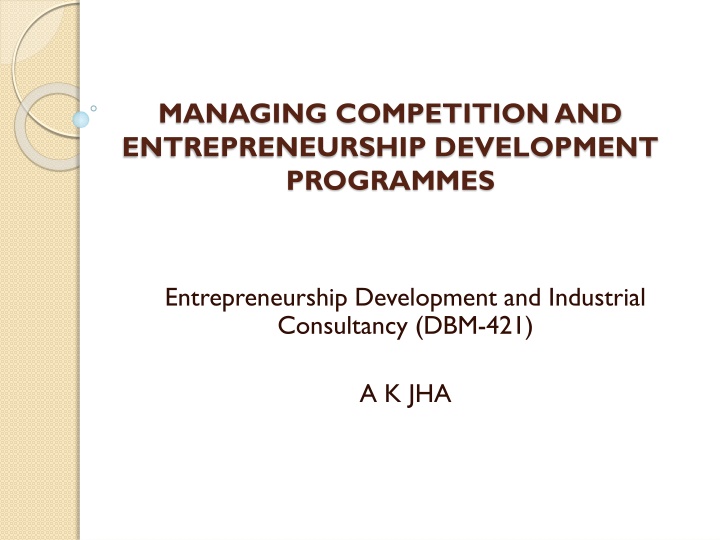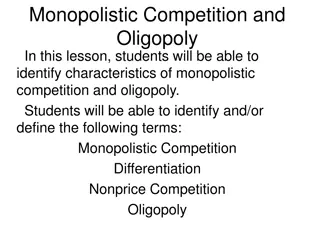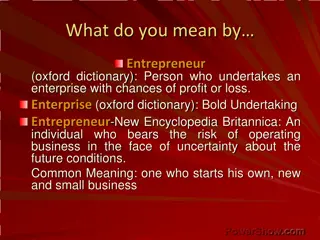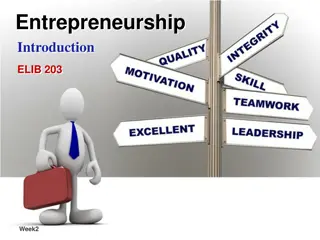
Entrepreneurship Development and Industrial Consultancy Programme Overview
Explore the Entrepreneurship Development and Industrial Consultancy Programme (DBM-421) led by A.K. Jha. Discover how Entrepreneurship Development Programmes (EDPs) aim to enhance entrepreneurial skills, address business challenges, and provide necessary training to successfully run a business. Gain insights into the objectives and topics covered in EDPs, including motivation, managerial knowledge, external support, feasibility reports, and enterprise visits.
Download Presentation

Please find below an Image/Link to download the presentation.
The content on the website is provided AS IS for your information and personal use only. It may not be sold, licensed, or shared on other websites without obtaining consent from the author. If you encounter any issues during the download, it is possible that the publisher has removed the file from their server.
You are allowed to download the files provided on this website for personal or commercial use, subject to the condition that they are used lawfully. All files are the property of their respective owners.
The content on the website is provided AS IS for your information and personal use only. It may not be sold, licensed, or shared on other websites without obtaining consent from the author.
E N D
Presentation Transcript
MANAGING COMPETITION AND ENTREPRENEURSHIP DEVELOPMENT PROGRAMMES Entrepreneurship Development and Industrial Consultancy (DBM-421) A K JHA
Entrepreneurship Development Programmes (EDP) Entrepreneurship development Programmes are designed to help a person who is willing to start a new venture. The motive of the EDP is to train and develop the entrepreneurial skills of a person to make him able to run the business successfully. EDPs focus on developing the capabilities of the entrepreneurs to effectively address the challenges associated with the business under the competitive business environment.
Objective of Entrepreneurship Development Programme Inculcate and reinforce the entrepreneurial skills and capability. Select products and formulate project proposal for the same. Analyse the environment Provide detail knowledge enterprise. Make them familiar with source of financial help and other support for establishing an enterprise. Provide guidance and help in increasing necessary managerial skills to start and run an enterprise. Enable entrepreneur to take decision Enable to communicate 1. 2. 3. 4. about setting up of 5. 6. 7. 8.
Topics of EDP An EDP focuses on following topics: 1. Introduction It should cover fundamental issues and information on Entrepreneurship.For example - Opportunities available entrepreneurship - Factors affecting the industries (particularly small and medium scale industries) - Role and importance of entrepreneurs in economic development - Supports available from government and other sources for establishing an enterprise - Soft skills for the entrepreneurs,etc. in the area of
Topics of EDP 2. Motivation of entrepreneurs - It is one of the most challenging aspects of EDPs that is critical for motivating and encouraging an aspiring entrepreneur establishing a venture. 3. Managerial know how To establish and run an enterprise knowledge and understanding of managerial principles is desirable. It is imperative to impart basic and specific knowledge regarding important managerial functions like finance, marketing, production, etc. for
Topics of EDPs 4. External help - Government and some of the non-government organizations render entrepreneurs/small scale industries. - The participants of EDPs are given knowledge about obtaining support from such sources. 5. Feasibility report - Knowledge about preparation and analysis of project feasibility report is provided. 6. Enterprise visits - Finally plant/ industrial visits are arranged so as to give a feel of real life situations to establish and run an enterprise. necessary supports to
Managing Competition Essential to sustain in the business and run it profitably. To expand and build a strong brand from a small enterprise, knowledge of competition and competitors are essential. Globalization has raised the level of competition. A meticulously designed and well executed business and marketing plan helps in effectively address the challenges of competition. For the formulation of effective market strategy, an entrepreneur must identify and study his competitors and potential customers. An enterprise should find out its competitors by adopting marketing and industry based analysis. An understanding and knowledge about the strategies, objectives, strengths and weaknesses of the competitors help entrepreneur manage the competition effectively.
Categories of Organizations From competition's view point organizations can be categorized as a) Market leader A market leader possess largest market share. In order to remain dominant, market leader searches for ways to expand total market demand, tries to protect its current market share and even tries to increase the market share. b) Market challenger A market challenger targets the market leader and other organization in an aggressive way to capture higher market share by adopting general as well as specific strategies.
Categories of Organizations c) Market follower A market follower is a runner up organization which is interested to maintain its market share. d) Market nicher strategy. A market nicher caters to small market not served by larger enterprises. Entrepreneur needs to monitor the moves of these organizations to remain secured as well as improve its status in the market by successfully handling competition. the market






















